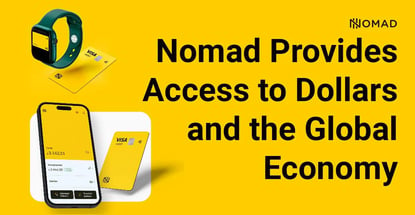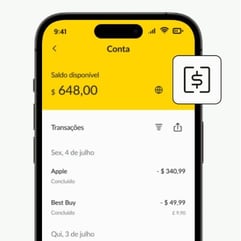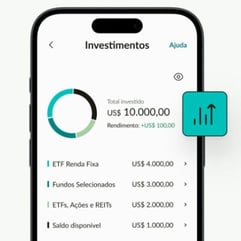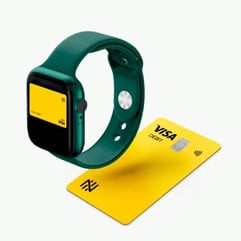
Our experts and industry insiders blog the latest news, studies and current events from inside the credit card industry. Our articles follow strict editorial guidelines.
In a Nutshell: The problem with global integration for many living in developing countries is that currency fluctuation, immature investment markets, and political flux dampen opportunity. In Brazil, Nomad fixes those problems by providing a global dollar account and international debit card, transparent access to international transfers and currency exchange, and access to stocks, ETFs, and REITs directly from US markets. Nomad has gained more than 1 million users since rolling out in late 2020, signaling Brazil’s global economic prominence.
It’s a big world out there, but digital transformation in financial services makes it smaller by spreading opportunities to more people. That means circumventing borders and barriers that keep people on one side of an arbitrary line from accessing tools, resources, and advantages that people on the other side take for granted.
The history of hyperinflation in the highly populous developing nation of Brazil, for example, disincentivizes saving and investing. Although inflation is more subdued in modern Brazil than in previous generations, currency devaluation and fluctuation continue to discourage risk-taking and wealth-building. Compared to the US, Brazil’s investment market is relatively meager as a result.

Add to that Brazil’s entrenched banking establishment with its high-fee, exclusionary approach and a political climate characterized by flux and overregulation. Brazil has a lot of potential, but the status quo seems to conspire against it and prevent Brazilians from realizing it.
That’s why the Nomad app has taken Brazil by storm since its introduction in late 2020. In that short time, more than 1 million users have signed on with Nomad to access its dollar-based global account and international debit card and to invest in US stocks, ETFs (exchange-traded funds), and REITs (real estate investment trusts).
CFO Natalia Lima said Nomad combines transparency, ease of use, and financial integration in a way unprecedented in the Brazilian financial services sector. Although the app’s cross-border capabilities make it a default choice for travelers, it’s a no-brainer for all Brazilians looking to protect and grow their assets in strong and stable US dollars and investments.
“Volatility wipes out wealth, and the Brazilian real has a lot of volatility,” Lima said. “Access to dollars in a bank account is already seen as an investment for the typical Brazilian.”
Global Account and Card Allow Borderless Finances
Brazil imports a significant portion of its consumer goods. Brazilians are familiar with the downsides of the country’s inflationary economy, currency devaluation, and volatility.
“Volatility wipes out wealth, and the Brazilian currency has a lot of volatility,” Lima said.
But Brazilians also struggle with institutional barriers. For example, the Brazilian government levies a 4.38% fee on credit card transactions abroad. That fee has declined recently but is still a significant dampening tax on outward-facing economic activity.

The backbones of the Nomad solution, its global account and international debit card, fix those problems simultaneously. The solution provides Brazilians with a dollar-based, FDIC-insured financial storehouse they can use abroad or for eCommerce purchases without exposure to confiscatory taxes and fees, overcoming the restrictions of purely domestic financial services solutions.
Furthermore, Brazil’s entrenched legacy banking establishment imposes onerous fees of 4-7% on foreign exchange services. It’s as if the nation wants Brazilians to turn inward when digital transformation elsewhere encourages consumers to participate.
“In addition to high fees, there’s little transparency in the fee approach,” Lima said. “How do you calculate and plan for your travel budget when you don’t even know what you’ll pay in the end?”
Therefore, Nomad allows users to send and receive US dollars safely and quickly and to exchange dollars and reais in a transparent fee environment. Transfers occur at the official exchange rate with minimal service fees and financial transaction taxes.
Lima said combining a dollar-based bank account, card, and seamless transfers and exchanges puts Brazilians on an even playing field with competitors in the global marketplace.
“From the get-go, our mission has been to provide access to dollar-based bank accounts to Brazilians who don’t live in the US,” Lima said. “That’s what we’re here to do.”
Investment Platform Protects and Grows Assets
Another consequence of Brazil’s traditional economic myopia is a relatively moribund investment sector. While the US and other nations invite international investment through healthy and active exchanges, Brazil makes do with a market a fraction of the size.
“The size of the Brazilian versus the US market is smaller by many multiples,” Lima said. “The companies and sectors you can access are much more limited.”

Signing up for a Nomad investment account counters those disadvantages by allowing users structured access to US stocks, ETFs, and real estate investment trusts. Insured for up to $500,000 by a US federal agency, Nomad investment accounts increase diversification opportunities across markets, sectors, and industries and allow investors to park assets in stable US dollars versus reais.
Nomad makes investing easy by recommending portfolios based on conservative, moderate, and aggressive return strategies. More aggressive strategies incorporate international securities, while the most conservative confines holdings to US Treasury fixed-income securities.
Either way, Nomad updates users on tax obligations and provides very low-cost commercial-rate exchange services, drawing on the other side of its business.
The result is a platform built for global integration and wealth building accessible to a large and growing consumer base that previously didn’t have the option.
It’s easy for Nomad registered account holders to begin investing by visiting the investments area of the app and answering a few questions. Investors may enter the market for as little as $1. Investing in treasuries, ETFs, and REITs through Nomad gives investors a stake in the growing US economy.
“Now Brazilians can invest dollars in the US stock market,” Lima said. “Nomad isn’t just about economic integration; it is about amplification and market creation.”
Seamless Access to Global Financial Life
Now that Brazil’s economic cat is out of the bag, Nomad foresees growth on the horizon. Lima suggested the company expects Brazilians to invest more than $200 billion over the next five to seven years.
While Nomad initially appealed primarily to travelers looking for more affordable card, exchange, and transfer services, about half of Nomad’s current customer base hasn’t traveled beyond Brazil’s borders.
“That makes sense,” Lima said. “Our value proposition to Brazilian consumers is to hold part of your wealth in dollars and use it globally whenever you want.”

Still, as a former US resident and frequent traveler, Lima speaks from experience when she declares Nomad’s fee-transparency approach a game changer.
“I still have a US card with no exchange fees, but that isn’t typical in Brazil,” she said. “Those fees really hurt.”
Nomad offers travelers additional benefits, including discounts, cash back, and access to VIP airport lounges. It also provides up to 10% savings on ticket purchases, accommodation reservations, and travel insurance contracts.
Meanwhile, Nomad engages itself in wealth creation oriented in the domestic direction through a recent partnership that sees the platform attracting dollars from digital content creators and other global workers to Brazil.
“That’s a more specific niche but one that really resonates with our story,” Lima said.
As Nomad grew explosively in 2022-23, it also began to look deeply at its structure to mature its business approach. It transferred its card business from Mastercard to Visa, discarded partnerships in favor of a more vertical organization, and began looking at profitability for long-term success.
Nomad seems poised to accompany Brazil as it grows beyond its economic legacy to become one of the world’s highly developed nations.
“If you’re Brazilian and traveling, you should be using Nomad because it makes the most sense,” Lima said. “It’s also logical that Brazilians should hold part of their wealth in dollars.”


![7 Best Credit Cards for Single Parents ([updated_month_year]) 7 Best Credit Cards for Single Parents ([updated_month_year])](https://www.cardrates.com/images/uploads/2019/12/Best-Credit-Cards-for-Single-Parents.jpg?width=158&height=120&fit=crop)
![“Do Prepaid Cards Work on Cash App?” ([updated_month_year]) “Do Prepaid Cards Work on Cash App?” ([updated_month_year])](https://www.cardrates.com/images/uploads/2021/01/Do-Prepaid-Cards-Work-on-Cash-App--1.png?width=158&height=120&fit=crop)
![How to Get a Black Card – American Express® Requirements ([updated_month_year]) How to Get a Black Card – American Express® Requirements ([updated_month_year])](https://www.cardrates.com/images/uploads/2016/03/How-to-Get-a-Black-Card-2--1.jpg?width=158&height=120&fit=crop)
![Average Credit Card Debt in American Households ([current_year]) Average Credit Card Debt in American Households ([current_year])](https://www.cardrates.com/images/uploads/2018/01/avgdebt.png?width=158&height=120&fit=crop)
![7 Best American Express Card Alternatives ([updated_month_year]) 7 Best American Express Card Alternatives ([updated_month_year])](https://www.cardrates.com/images/uploads/2018/11/amexalt.png?width=158&height=120&fit=crop)


